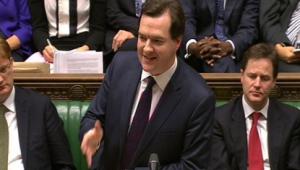By Tash Shifrin
23 July 2009
Experts have warned that adding defence spending to the politically sensitive areas to be spared from cuts would require more than 16% to be slashed from other Whitehall budgets over three years.
The warning came after Business Secretary Lord Mandelson suggested that Labour would seek to protect defence spending if it were returned to power after the general election.
Official public finance figures released on July 21, showing a record level of public sector debt, added to the political tension over Labour and Conservative public spending plans.
Both the government and the Tories have pledged to protect NHS spending and to meet United Nations targets for overseas aid, while Schools Secretary Ed Balls said last month that ‘real rises’ in the schools budget would be possible.
But in a July 19 media interview, Mandelson said it was ‘not the intention’ of ministers to cut defence spending. ‘I, and other members of the government, would place defence alongside other frontline services, which it is our ambition to maintain adequate frontline spending on,’ he said.
Carl Emmerson, deputy director of the Institute for Fiscal Studies, said freezing – rather than cutting back – NHS spending for the three years from 2011 would require a 10% cut in other Whitehall spending.
He told Public Finance: ‘Meeting the overseas development target and freezing schools spending increases the cuts required elsewhere to 13.5%. If we also freeze defence spending, this increases to 16.3%.’
Tony Travers, director of the Greater London Group at the London School of Economics, said: ‘The difficulty is if you protect a very large area of public spending... it inevitably, in a geared way, increases cuts for smaller spending heads. This is more political posturing than a real programme for public management.’
Professor Malcolm Prowle of Nottingham Business School said: ‘I don’t think there’s an easy or painless way round it. We’ve really got to have a radical rethink about what the state does and what it can afford to do.’ Such an approach would put question marks over many quangos and whether Britain could afford to be a military ‘world power’, he said.
The question of how to fill the gaping hole in the Treasury’s coffers was given fresh impetus as the Office for National Statistics revealed that public sector debt hit a record high of 56.5% of gross domestic product at the end of June.
Although the figures were not as gloomy as some analysts had predicted, the net debt of £798.8bn at the end of June is the highest as a proportion of GDP since records began in 1974. Borrowing for June was £13bn, up from £7.5bn in the same month last year.
Emmerson said the statistics did hold some comfort for the government as they suggested the public finances were in line with Treasury predictions.
‘It would be an astonishing shock if any public finance figures didn’t look really bad – and these figures do look really bad. But it’s not bad relative to the Budget,’ he said.
But the ONS figures were followed by a forecast from the National Institute for Economic and Social Research that recovery from recession would be weaker than outlined in the Budget.
Director Martin Weale told PF that a mixture of spending cuts, tax rises and extending working lives – ‘saving on pensions and raising tax revenues’ – would be needed to restore the public finances.
‘It’ll be that mixture. The question is, in what proportions? The Conservatives, if they become the next government, will soon discover that cutting spending on its own won’t do the job.’
Treasury action to prop up the banks also came under the spotlight this week as the National Audit Office refused to sign off the department’s 2008/09 resource accounts. The accounts were qualified, for the first time in a decade, because of £24bn of unauthorised expenditure incurred on the Asset Protection Scheme – the programme to insure banks against future losses.
In-principle agreements with the Royal Bank of Scotland and Lloyds Banking Group had been made too late to be authorised by Parliament in the Spring Estimates.
23 July 2009
Experts have warned that adding defence spending to the politically sensitive areas to be spared from cuts would require more than 16% to be slashed from other Whitehall budgets over three years.
The warning came after Business Secretary Lord Mandelson suggested that Labour would seek to protect defence spending if it were returned to power after the general election.
Official public finance figures released on July 21, showing a record level of public sector debt, added to the political tension over Labour and Conservative public spending plans.
Both the government and the Tories have pledged to protect NHS spending and to meet United Nations targets for overseas aid, while Schools Secretary Ed Balls said last month that ‘real rises’ in the schools budget would be possible.
But in a July 19 media interview, Mandelson said it was ‘not the intention’ of ministers to cut defence spending. ‘I, and other members of the government, would place defence alongside other frontline services, which it is our ambition to maintain adequate frontline spending on,’ he said.
Carl Emmerson, deputy director of the Institute for Fiscal Studies, said freezing – rather than cutting back – NHS spending for the three years from 2011 would require a 10% cut in other Whitehall spending.
He told Public Finance: ‘Meeting the overseas development target and freezing schools spending increases the cuts required elsewhere to 13.5%. If we also freeze defence spending, this increases to 16.3%.’
Tony Travers, director of the Greater London Group at the London School of Economics, said: ‘The difficulty is if you protect a very large area of public spending... it inevitably, in a geared way, increases cuts for smaller spending heads. This is more political posturing than a real programme for public management.’
Professor Malcolm Prowle of Nottingham Business School said: ‘I don’t think there’s an easy or painless way round it. We’ve really got to have a radical rethink about what the state does and what it can afford to do.’ Such an approach would put question marks over many quangos and whether Britain could afford to be a military ‘world power’, he said.
The question of how to fill the gaping hole in the Treasury’s coffers was given fresh impetus as the Office for National Statistics revealed that public sector debt hit a record high of 56.5% of gross domestic product at the end of June.
Although the figures were not as gloomy as some analysts had predicted, the net debt of £798.8bn at the end of June is the highest as a proportion of GDP since records began in 1974. Borrowing for June was £13bn, up from £7.5bn in the same month last year.
Emmerson said the statistics did hold some comfort for the government as they suggested the public finances were in line with Treasury predictions.
‘It would be an astonishing shock if any public finance figures didn’t look really bad – and these figures do look really bad. But it’s not bad relative to the Budget,’ he said.
But the ONS figures were followed by a forecast from the National Institute for Economic and Social Research that recovery from recession would be weaker than outlined in the Budget.
Director Martin Weale told PF that a mixture of spending cuts, tax rises and extending working lives – ‘saving on pensions and raising tax revenues’ – would be needed to restore the public finances.
‘It’ll be that mixture. The question is, in what proportions? The Conservatives, if they become the next government, will soon discover that cutting spending on its own won’t do the job.’
Treasury action to prop up the banks also came under the spotlight this week as the National Audit Office refused to sign off the department’s 2008/09 resource accounts. The accounts were qualified, for the first time in a decade, because of £24bn of unauthorised expenditure incurred on the Asset Protection Scheme – the programme to insure banks against future losses.
In-principle agreements with the Royal Bank of Scotland and Lloyds Banking Group had been made too late to be authorised by Parliament in the Spring Estimates.




















